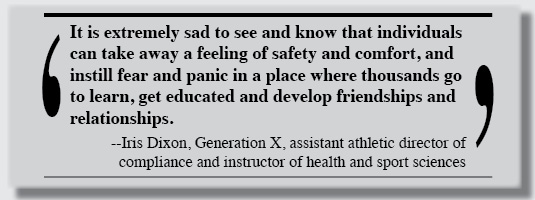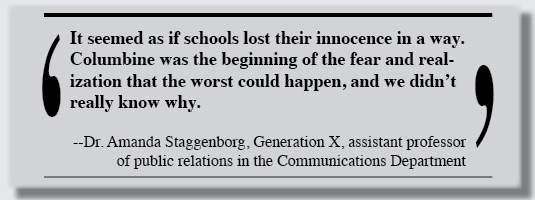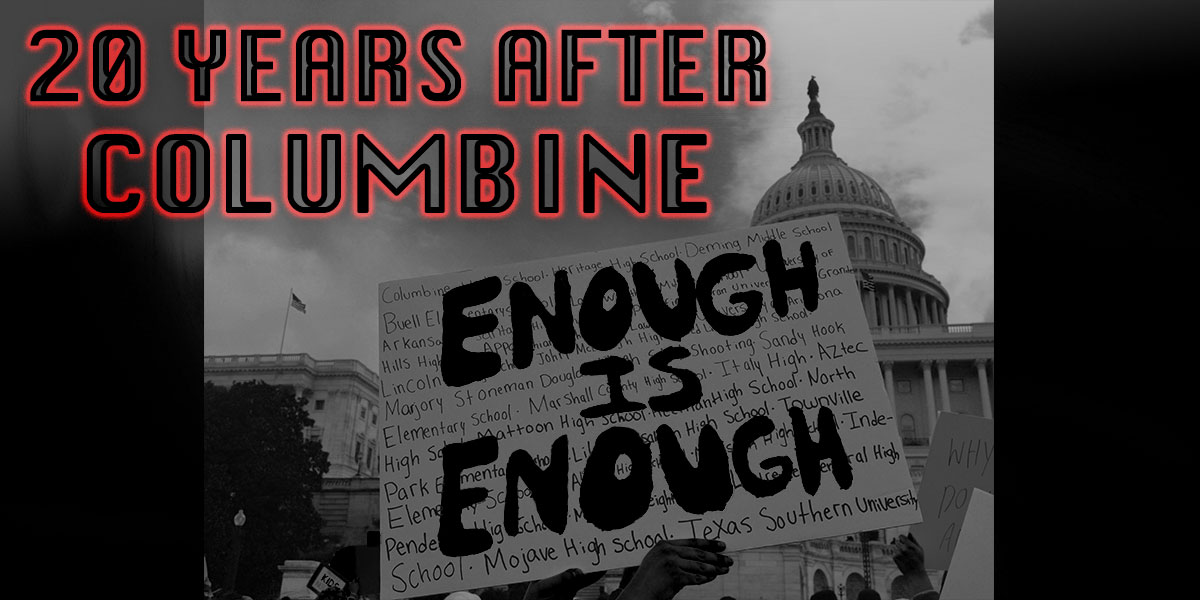— Part 5 of an 8-Part Series —
Columbine shooters, Eric Harris and Dylan Klebold, killed 13, injured more than 20 and initiated a permanent change in America’s sense of security in schools. While millennials, Generation Xers and baby boomers grew up in a pre-Columbine era, Generation Z has never known a world in which school safety was the norm.
Gen Zers are accustomed to a world where mass shootings make the weekly news, fearing for ourselves, our communities and our schools. But those who grew up before April 20, 1999, witnessed the country transition from a safer society to this tragic normality. According to an article posted on the North Carolina Sun Journal, when you talk to local officials about school safety, they speak in terms of eras: BCE and CE, as in Before the Columbine Era and the Columbine Era. After 10 students and teachers were killed in the Santa Fe High School shooting in Texas, in May 2018, a reporter asked a 17-year-old student, Paige Curry, if any part of her thought “this isn’t real, this wouldn’t happen in my school?” Curry calmly answered: “No, there wasn’t. It’s been happening everywhere. I’ve always kind of felt like eventually it was going to happen here, too,” according to the 2019 Guardian article, written by Amanda Holpuch. Most current college students are members of Gen Z, and they all have their own views regarding the rise of mass shootings since Columbine and its influence on daily life. Michael Knox, a senior ministry and leadership major from Houston, Texas, said, “As a former Law Enforcement Explorer, I have spent a considerable amount of time studying mass shootings,” and the subject rolls through his mind on a regular basis. “I spend lots of time considering what I would do if a mass shooting were to occur in a building or location that I am in,” Knox said in an email. In regards to fearing an active shooter situation, Christian Akridge, sophomore broadcast media major from St. Louis, said he’s highly aware there is a clear and present danger in this world, and that “it’s pretty hard to imagine a world where there are no mass shootings, simply because we live in a world filled with sinful people.” Rachel Fallon, junior marketing major from St. Louis, said each time another shooting occurs, she thinks about the subject more frequently for awhile. “I wonder what is in people’s heads that make them want to kill innocent people,” Fallon said in an email. “The only time I remember thinking about a shooting without being triggered by a very recent news report is in airports. Last year I flew pretty frequently, and that’s all I could think about while in the airport.” As for millennials (born 1981-96), Generation X (born 1965-80) and baby boomers (born 1946-64), the very idea of this tragedy was nonexistent before Columbine. According to the 2018 Sun Journal article, the problems of school safety, in the BCE, “amounted to controlling kids who talked back to teachers, bullies who slammed the chess club kids against lockers, and popping gum in class.” Baby boomer Aaron Stevenson, who grew up in a small town outside of Hartford, Connecticut, said nearly everyone walked to school when he was a kid, and no one imagined the possibility of a school shooting. He said he felt protected by teachers and administrators in grade school, and that mass shootings in schools, which have drastically increased in the last 20 years, were practically unknown. “Even 45 years later, I remember thinking they treated us like their kids and they wouldn’t let anyone hurt us,” Stevenson said in an email. “I never gave a second thought to something like that happening.” In 2015–16, 95 percent of public schools performed some version of intruder or active shooter drills, according to the National Center for Education Statistics. And that was before 17 students were killed in February 2018 at Stoneman Douglas High School in Florida. When Stevenson and a majority of baby boomers were in school, these drills were not practiced. “The only thing I can remember we ever did was fire drills,” Stevenson said. “I do remember one or two occasional bomb scares, but it was usually from some clown who didn’t want to come to school that day. I don’t remember ever hearing or thinking about a gunman in school.” Iris A. Dixon, MBU assistant athletic director of compliance, former head women’s basketball coach, and instructor of health and sport sciences, is a member of Generation X who recognized today’s modern world “consists of tragedy, especially targeting schools.” In grade school through high school, Dixon said, no one worried about metal detectors or armed security guards roaming the halls. School was a safe place. In college, she felt there was a little more awareness, but it was only about the violence in the world and never directly affected her safety. “It is extremely sad to see and know that individuals can take away a feeling of safety and comfort, and instill fear and panic in a place where thousands go to learn, get educated and develop friendships and relationships,” Dixon said in an email. “It’s a selfish and cowardly act and no regard for human life.” Dr. Amanda Staggenborg, Generation X, assistant professor of public relations and instructional coordinator of undergraduate communications in the Communications Department of the Fine Arts Division, was a sophomore in college at the time of the Columbine shooting and said she remembers the day clearly. “It seemed as if schools lost their innocence in a way,” Staggenborg said. “Columbine was the beginning of the fear and realization that the worst could happen, and we didn’t really know why.” Scott Dollard, millennial who graduated from the University of Missouri in 2003, said he never heard of intruder drills in grade school. Dollard, who was a freshman in college at the time of the Columbine shooting, said, “It was a huge news story, one that you remember exactly where you were when you heard about it.”

